Diogenes Laertius’s main intention was to write biographies of male philosophers[1]. However, his writings also reveal, sometimes unintentionally, women’s roles and attitudes to women in ancient times. His anecdotes and longer exploratory writing include references to wives, daughters, slaves and courtesans. He quoted from wills and letters, and also from hearsay. The general themes include misogyny, as explored in part 2, but he also gave examples of respectful behavior towards women, and of the humor involved in negotiating congenial relationships.
He can be ambiguous and contradictory. Plato, as we saw in part 2, was content to include women in his school, and yet he did not see a role for them in politics. The following comment is not only misogynistic, but also badly observed:
The natural rulers are the males, not only among men, but also among the other animals; for the males everywhere exert wide-reaching rule over the females.
(3; Plato; 92)
Sometimes misogyny is cloaked in humor, with several of the philosophers’ one-line responses being worthy of music-hall comedians. Diogenes tells us of Socrates:
Someone asked him whether he should marry or not, and received the reply, “Whichever you do you will repent it.”
(2; Socrates; 33)

Philosophy can save men from misogyny. Polemo was a spendthrift and drunk until he found philosophy, which seems to have given him extraordinary power:
Polemo himself had been defendant in an action brought by his wife, who charged him with cruelty owing to the irregularities of his life; but that, from the time when he began to study philosophy, he acquired such strength of character as always to maintain the same unruffled calm of demeanour. Nay more, he never lost control of his voice.
(4; Polemo; 17)
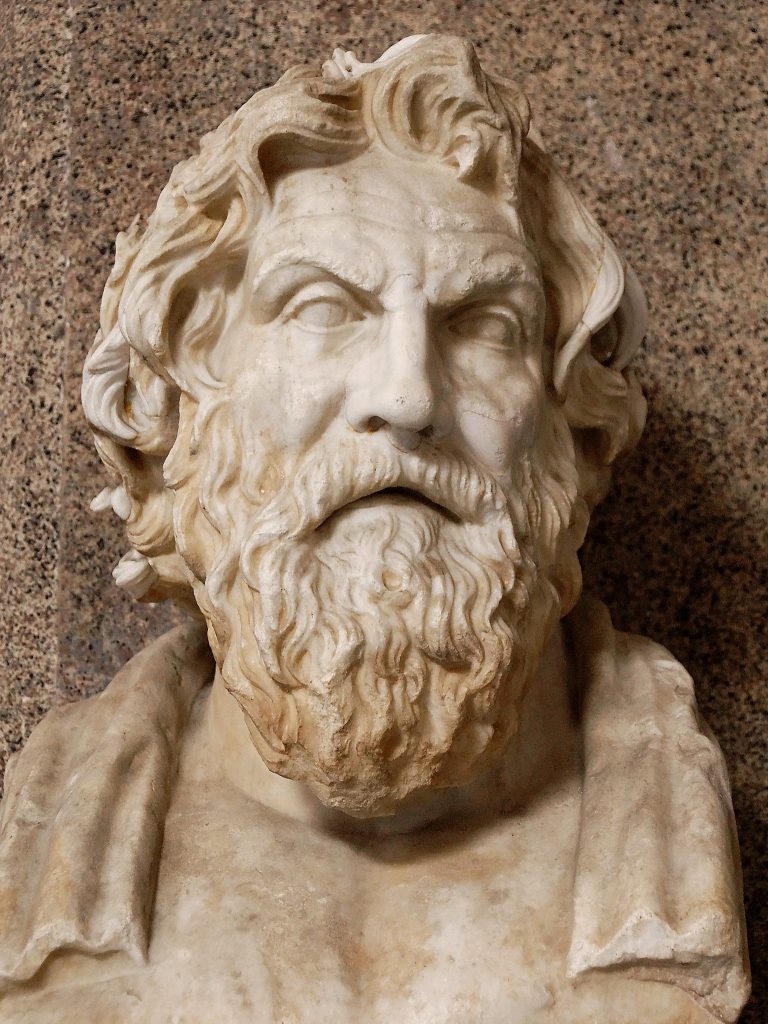
Diogenes’s examples of respect for women include Antisthenes, for example, who said that ‘Virtue is the same for women as for men. (6; Antisthenes; 12). No double standard there. Respect for women is also demonstrated in attitudes towards women’s education. In previous posts we met Aristippus and Plato, both of whom included women in their lists of pupils. Diogenes said of Cleobulus:
He said that we ought to give our daughters to their husbands maidens in years but women in wisdom; thus signifying that girls need to be educated as well as boys.
(1; Cleobulus; 91)
Attitudes to women, then, varied, as they do today. Diogenes told us a lot about philosophers’ views on marriage, including the stoics’ views on polygamy or group marriage. Polyandry is not mentioned, and it is not clear who should have a free choice of partners:
It is also [the stoics’] doctrine that amongst the wise there should be a community of wives with free choice of partners, as Zeno says in his Republic and Chrysippus in his treatise On Government (and not only they, but also Diogenes the Cynic and Plato). Under such circumstances we shall feel paternal affection for all the children alike, and there will be an end of the jealousies arising from adultery.
(7; Zeno; 131)
This sounds like a 1960s hippy commune. There is plenty of advice about conventional marriage. Plato allegedly said that wise men would marry (3; Plato; 78); Epicurus, on the other hand, advised them not to (10; Epicurus; 119). Love features very little, although the stoics apparently believed in ‘its sole end being friendship, not bodily enjoyment’, and that ‘love depends upon regard, as Chrysippus says in his treatise Of Love, and is not sent by the gods’ (7; Zeno; 130). When choosing whom to marry, it is good to consider social status.
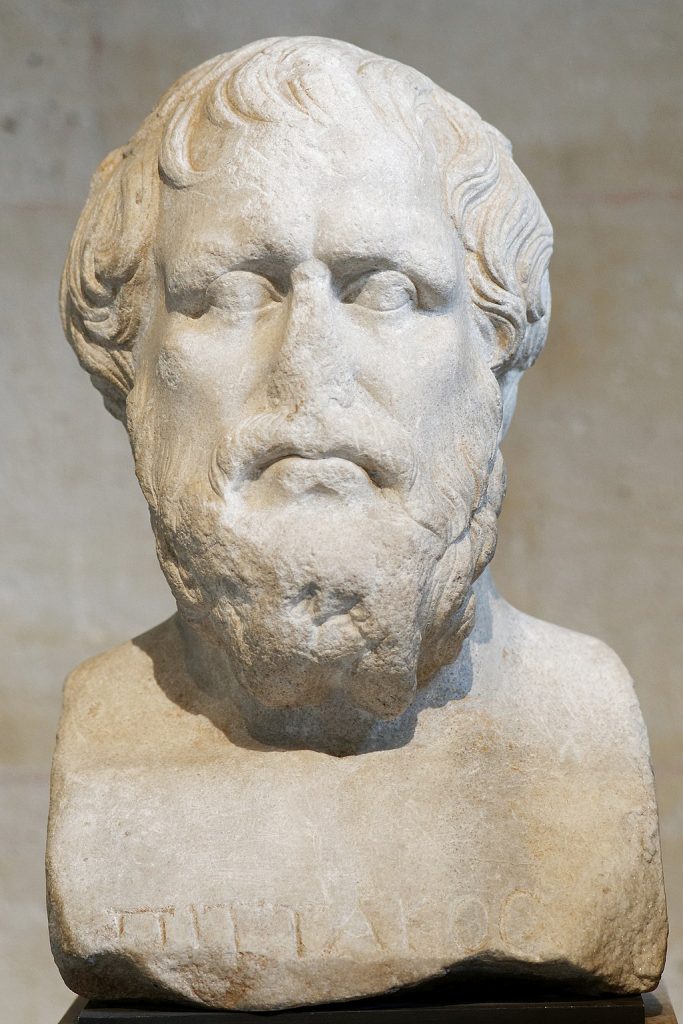
A stranger of Atarneus thus inquired of Pittacus, the son of Hyrrhadius:
Old sire, two offers of marriage are made to me; the one bride is in wealth and birth my equal; the other is my superior. Which is the better? Come now and advise me which of the two I shall wed. So spake he. But Pittacus, raising his staff, an old man’s weapon, said, “See there, yonder boys will tell you the whole tale.” The boys were whipping their tops to make them go fast and spinning them in a wide open space. “Follow in their track,” said he. So he approached near, and the boys were saying, “Keep to your own sphere.”
When he heard this, the stranger desisted from aiming at the lordlier match, assenting to the warning of the boys.
And, even as he led home the humble bride, so do you, Dion, keep to your own sphere. The advice seems to have been prompted by his situation. For he had married a wife superior in birth to himself: she was the sister of Draco, the son of Penthilus, and she treated him with great haughtiness.
(1; Pittacus, 80).
Cleobulus offered a similar message:
Mate with one of your own rank; for if you take a wife who is superior to you, her kinsfolk will become your masters. (1; Cleobulus; 92).
Physical beauty was not seen as the ultimate desirable quality, for it could lead to unfaithfulness. Diogenes attributed this advice to Bion, Arcesilaus and Antisthenes in different places in his work.
Once married, it is best to behave well in public:
Avoid being affectionate to your wife, or quarrelling with her, in the presence of strangers; for the one savours of folly, the other of madness. (1; Cleobulus; 92)
Epicurus gave us some advice about sex:
No one was ever the better for sexual indulgence, and it is well if he be not the worse.
(10; Epicurus; 118)
For Pythagoras, though, sexual indulgence is OK, as long as we indulge at the right time:
Of sexual indulgence, too, he says, “Keep to the winter for sexual pleasures, in summer abstain; they are less harmful in autumn and spring, but they are always harmful and not conducive to health.”
(8; Pythagoras; 9).
Kosmos Society’s readers might also take note that Antisthenes said that:
We also ought to make love to such women as will feel a proper gratitude.
(6; Antisthenes; 3)
Sometimes it is easy to think that women in myth, like Briseis and Andromache, were simply victims of a brutal and misogynistic society. However, some of Diogenes’ sources reveal that respectful ideas were evident in the historical record. For example:
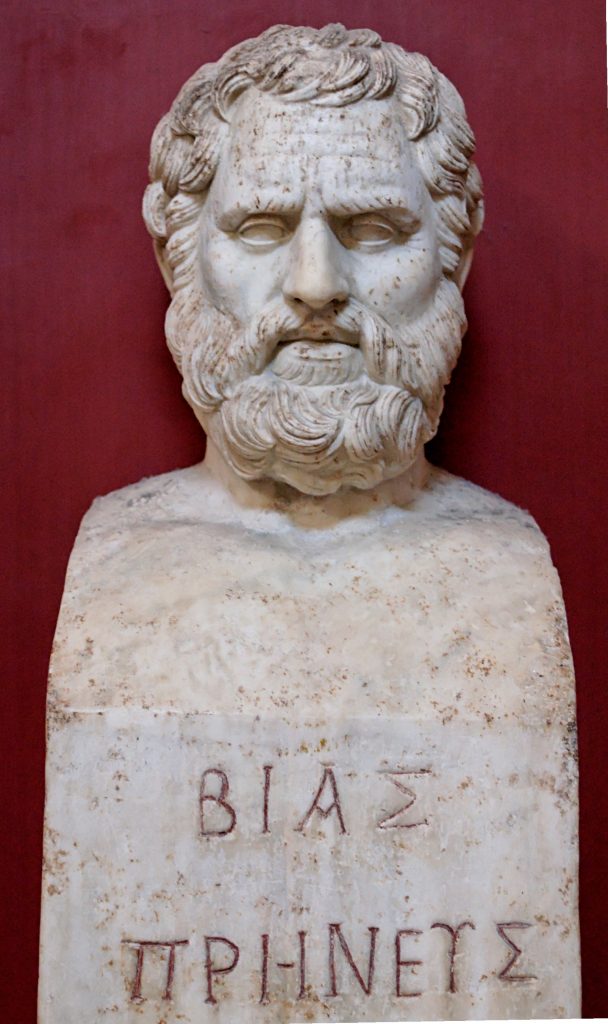
Phanodicus relates that [Bias] ransomed certain Messenian maidens captured in war and brought them up as his daughters, gave them dowries, and restored them to their fathers in Messenia
(1; Bias; 82)
Some actions may leave us questioning what is good and bad behavior towards women, slaves, and captors. In modern times it is not acceptable to treat people as property. Ancient wills, though, reveal that this was common, and daughters, sons, and slaves could be left to other people to deal with as they saw fit. Epicurus instructed his executors to care for his friend’s children economically, although there were conditions:
And let Amynomachus and Timocrates take care of Epicurus, the son of Metrodorus, and of the son of Polyaenus, so long as they study and live with Hermarchus. Let them likewise provide for the maintenance of Metrodorus’s daughter, so long as she is well-ordered and obedient to Hermarchus; and, when she comes of age, give her in marriage to a husband selected by Hermarchus from among the members of the School ; and out of the revenues accruing to me let Amynomachus and Timocrates in consultation with Hermarchus give to them as much as they think proper for their maintenance year by year . . . . when the girl comes of age, let Amynomachus and Timocrates pay her dowry, taking from the property as much as circumstances allow
(10; Epicurus; 19)
Epicurus also freed a female slave, Phaedrium. I find this to be ambiguous. On the one hand, Epicurus could be seen to be taking care of these youngsters, and freeing a slave. On the other hand, Phaedrium was still a slave until Epicurus died, and the children had follow Epicurus’s instructions even after his death. Similarly, Aristotle made provision for his daughter and other women in his life, including servants and slaves, but he often stipulated that the provisions should be made with their agreement:
[The executors] shall take care of [my unnamed daughter] in every other respect and, if she desires to be married, shall see that she be given to one not unworthy; and besides what she has already received they shall give her a talent of silver out of the estate and three handmaids whomsoever she shall choose besides the maid she has at present and the man-servant Pyrrhaeus; and if she chooses to remain at Chalcis, the lodge by the garden, if in Stagira, my father’s house. Whichever of these two houses she chooses, the executors shall furnish with such furniture as they think proper
(5; Aristotle; 13. Italics mine).
So, the daughter had choices, but the handmaids did not.
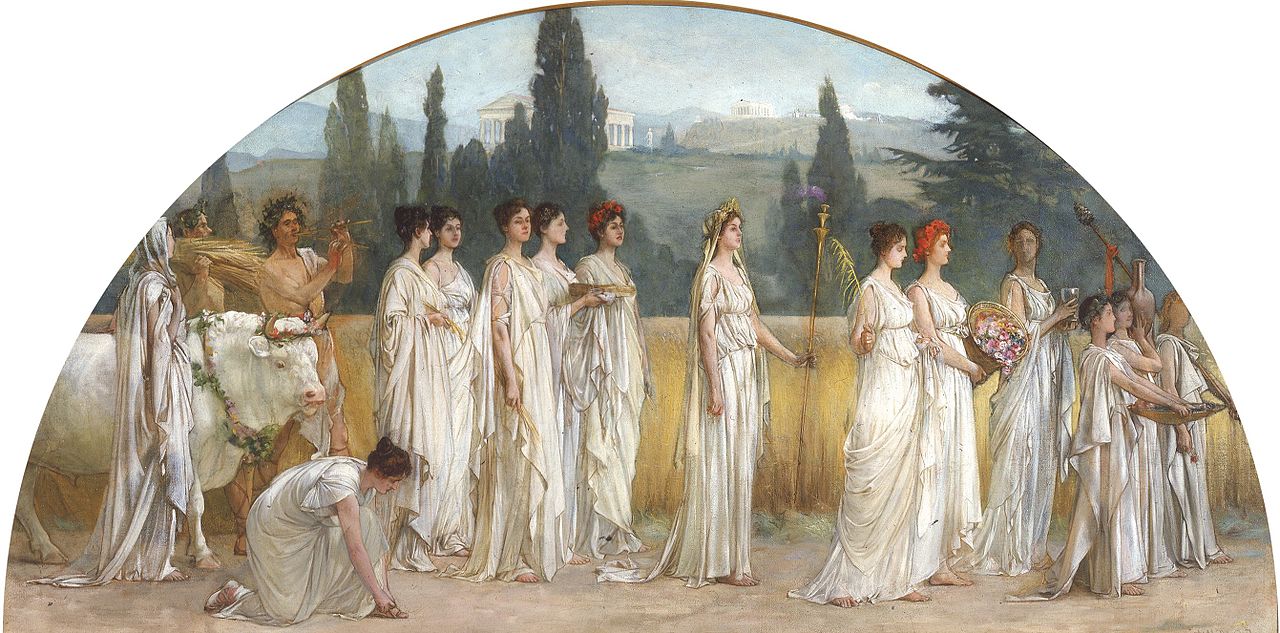
Sisters also featured in Diogenes’ stories. For example, Democritus took steps to enable his unnamed sister to attend the Thesmophoria festival:
When he was now very old and near his end, his sister was vexed that he seemed likely to die during the festival of Thesmophoria and she would be prevented from paying the fitting worship to the goddess. He bade her be of good cheer and ordered hot loaves to be brought to him every day. By applying these to his nostrils he contrived to outlive the festival; and as soon as the three festival days were passed he let his life go from him without pain,
(9; Democritus; 43)
Relationships with courtesans appear to be common, although the exact difference between them and slaves and captors seems to be obscure. It is likely that courtesans were Greeks, I think, while slaves and captors were not. But it seems likely that all were expected to be sexually available. Aristippus, who, as we have seen, ensured that his daughter was educated, seems to have had a number of relationships with courtesans:
A courtesan having told him that she was with child by him, he replied, “You are no more sure of this than if, after running through coarse rushes, you were to say you had been pricked by one in particular.
(2; Aristippus; 81)
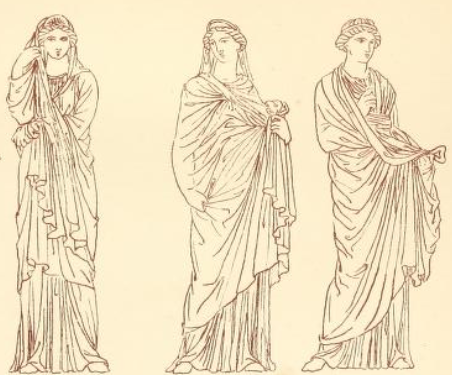
He showed some disdain for this woman, but liberated others:
And when Dionysius gave him his choice of three courtesans, he carried off all three, saying, “Paris paid dearly for giving the preference to one out of three.” And when he had brought them as far as the porch, he let them go. (2; Aristippus 67)
I find this ambiguity typical of Diogenes’ writing about women. Misogyny, respect, and humor feature frequently. It would be easy to disregard the misogyny and xenophobia evident in both myth and history: that was just the way it was; if we enjoy the poetry and the drama of ancient writings, we must tolerate the unacceptable aspects of ancient societies. The writer Madeline Miller recently wrote of her experience of studying classics:
One of my professors had started his course with the following salvo: “This is a class on Greek history, so I don’t want to hear any questions about women or slaves.”[2]
I suggest that this comment is evidence of poor scholarship. Women and slaves are part of history. I feel a ‘proper gratitude’ towards Diogenes’ Laertius and the women he wrote about. He revealed a number of things, not least, of course, evidence of the existence of women philosophers, teachers, writers, students, healers, astronomers, and of women who had their own ideas about how they wanted to live and how society should be. We have met slaves with humor, in spite of their oppression, cross-dressers, and angry, funny and intelligent women. But studying the women has also revealed things about men, and about society as a whole. Men exhibited, not only misogyny, but also respectful attitudes to women. The fact that respectful attitudes were being expressed within society removes any excuse for misogyny either being acceptable then, or unproblematic to modern scholars now. It may have been common, but it was not acceptable to everyone.
Previous posts in this series: part 1 | part 2
Notes
1 Diogenes’ Lives of the Eminent Philosophers is published on paper:
Diogenes Laertius (2011) Lives of the Eminent Philosophers. Translated by Robert Drew Hicks. Witch Books.
This translation is also available on Perseus.
The format I shall use for referencing is:
(book number; philosopher’s name; paragraph number)
2 “Madeline Miller on the Song of Achilles: ‘It helped people come out to their parents’”. The Guardian Friday 27 August 2021.
Image credits
Polemon, depicted as a medieval scholar in the Nuremberg Chronicle,
Public domain, via Wikimedia Commons
Antisthenes, Roman copy after a Hellenistic original.
Photo: Marie-Lan Nguyen Creative Commons Creative Commons Attribution 3.0 Unported license.
via Wikimedia Commons
Pittacus, Roman copy (c 1st century CE), of a Greek original (late Classical period). Louvre.
Photo: Marie-Lan Nguyen, public domain, via Wikimedia Commons
Bias of Priene, Roman copy of a Greek original.
Photo: Jastrow. Public domain, via Wikimedia Commons
Francis Davis Millet. Thesmophoria. 1894–1897
public domain via Wikimedia Commons
Greek women. Illustration: from J. Moyr Smith. 1882. Ancient Greek female costume. no copyright notice
plate 92: Various modes of wearing the himation, via archive.org
Anne Spendiff is a member of Kosmos Society